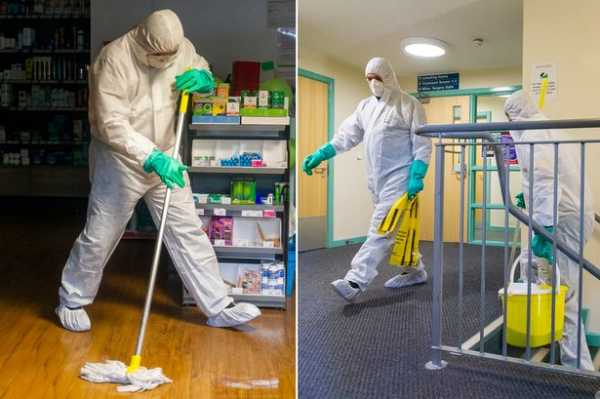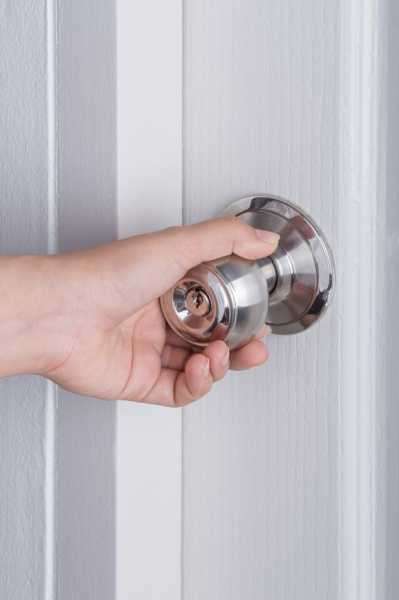Scientists have found found the coronavirus can survive for days on surfaces that are frequently touched- especially in crowded Tube stations and hospitals
-

RAF giving away massive 110ft bomber plane for free as force struggles with upkeep
-

Scout leader suspected of being coronavirus 'super spreader' who infected 11 Brits

The virus can linger on surfaces for days (Image: Getty Images)
Scientists say the coronavirus can survive on surfaces like door handles and bus or train poles for up to nine days.
The virus can linger on surfaces more than four times longer than flu, according to new research from Germany.
Its much hardier than common bugs – shedding fresh light on its rapid spread.
Surfaces that are frequently touched, like in hospitals or crowded Tube stations, are most likely to be harbouring the highly contagious disease.
But the potentially deadly droplets can be destroyed within a minute simply through regular wiping with disinfectants such as Domestos.

The virus lingers on surfaces four times longer than the flu (file photo)
(Image: Getty Images)
Corresponding author Professor Gunter Kampf said: "In hospitals these can be door handles, for example, but also call buttons, bedside tables, bed frames and other objects in the direct vicinity of patients, which are often made of metal or plastic."
In the first analysis of its kind his team pooled data from 22 previous studies on coronaviruses and their inactivation for a future textbook.
It focused on the Sars and Mers coronaviruses and found they can persist and remain infectious at room temperature for up to nine days. The average is four to five days.
Prof Kampf, of the Institute of Hygiene and Environmental Medicine at Greifswald University Hospital, said: "Low temperature and high air humidity further increase their lifespan."

Regular wiping with disinfectants can destroy the droplets
(Image: Getty Images/EyeEm)
The results published in the Journal of Hospital Infection should also apply to the current coronavirus 2019-nCoV, he said.
To put this in context flu viruses can survive on hard surfaces and infect another person for 24 to 48 hours.
The length of time cold viruses can live outside the body is even shorter – usually only a few hours.
The coronavirus 2019-nCov, dubbed the Wuhan virus, has already claimed more than 1,000 lives – more than the 774 Sars outbreak in 2003.
Both originated in China and virologists say they are genetically close. There is no specific therapy.
Prevention is of particular importance in order to stem the epidemic, said Prof Kampf.

Low temperature and high air humidity can lengthen the virus' lifespan
(Image: Getty Images/age fotostock RM)
Co-author Prof Eike Steinmann, head of the Department for Molecular and Medical Virology at Ruhr-University Bochum, said: "Under the circumstances, the best approach was to publish these verified scientific facts in advance, in order to make all information available at a glance."
Tests showed disinfectants and bleaches containing ethanol, hydrogen peroxide or sodium hypochlorite are most effective.
The latter is the main active ingredient in Domestos.
Applied in appropriate concentrations they almost completely destroy the pathogenic particles.
Prof Kampf said: "As a rule, this is sufficient to significantly reduce the risk of infection."
The experts assume the results from the analyses of other coronaviruses are transferable to the latest virus.
Different coronaviruses were analysed and the results were all similar.
Prof Kampf said: "The analysis of 22 studies reveals that human coronaviruses such as Severe Acute Respiratory Syndrome (SARS) coronavirus, Middle East Respiratory Syndrome (MERS) coronavirus or endemic human coronaviruses (HCoV) can persist on inanimate surfaces like metal, glass or plastic for up to 9 days.
"But they can be efficiently inactivated by surface disinfection procedures with 62-71% ethanol, 0.5% hydrogen peroxide or 0.1% sodium hypochlorite within one minute."
Other disinfectants containing benzalkonium chloride or chlorhexidine digluconate are less effective.
Prof Kampf said: "As no specific therapies are available for 2019-nCoV, early containment and prevention of further spread will be crucial to stop the ongoing outbreak and to control this novel infectious thread."
Sourse: www.mirror.co.uk





